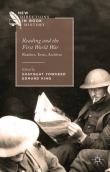AustLit
Latest Issues
AbstractHistoryArchive Description
'What role did reading play in the lives of those who experienced the First World War? This volume demonstrates that reading was both the prime leisure occupation and the main means for transmitting information for combatants and civilians during the war. Ranging from ordinary soldiers to conscientious objectors and from to war artists to civilians in occupied Belgium, the readers uncovered in this volume read for a multitude of reasons. Letters and books sent from home could bring soldiers in touch with family members and memories of lives lived before the war. Newspapers and trench journals helped maintain morale in the trenches and communicated war news and propaganda to civilian audiences. Bringing together respected specialists and emerging scholars, Reading and the First World War reveals the diversity of reading practices at the time and the central importance of reading in the experience of conflict, at the front and at home.' (Publication summary)
Notes
-
Contents indexed selectively.
Contents
-
William Albert Amiet, Barrister-at-Law, M.A., Reads His Way through the Great War,
single work
criticism
(p. 133-152)
'In 'William Albert Amiet, Barrister-at-Law, M.A., Reads His Way through the Great War', Cleary reconstructs the reading history of William Albert Amiet, a Queensland barrister who served in the Australian Imperial Forces as a company commander and was a member of Australia's nascent intellectual elite, A voracious reader, Amiet's diaries show him engaging with a highly varied range of British and European literature during the war: highbrow, classic and popular Amiet clearly saw himself as belonging to the British reading nation and his habits of literary consumption reflect that sense of allegiance, at once both Australian and Imperial subject. Cleary's essay is part of a new trend in Australian book history that emphasises the transnational nature of both the book and trade and settler identity during the period. (Editors introduction 18)
-
A Captive Audience? The Reading Lives of Australian Prisoners of War, 1914-1918,
single work
criticism
(p. 153-167)'Edmund G. C. King's chapter...tackles the question of ANZAC reading from another angle. Drawing upon a sample of correspondence sent by Australian prisoners of war to the Australian Red Cross asking for reading material, King is able to complement Cleary's study by introducing a range of other Australian readers...' (Editor's introduction 18)




